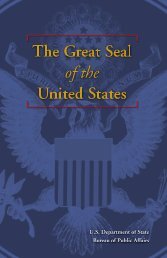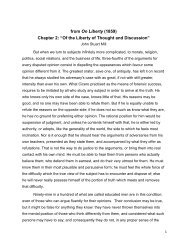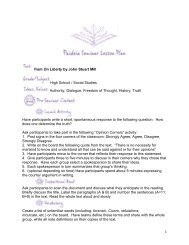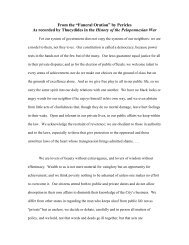Rousseau_contrat-social
You also want an ePaper? Increase the reach of your titles
YUMPU automatically turns print PDFs into web optimized ePapers that Google loves.
to ourselves.<br />
In general, to establish the right of the first occupier over a plot of<br />
ground, the following conditions are necessary: first, the land must not<br />
yet be inhabited; secondly, a man must occupy only the amount he needs<br />
for his subsistence; and, in the third place, possession must be taken,<br />
not by an empty ceremony, but by labour and cultivation, the only sign<br />
of proprietorship that should be respected by others, in default of a<br />
legal title.<br />
In granting the right of first occupancy to necessity and labour, are we<br />
not really stretching it as far as it can go? Is it possible to leave<br />
such a right unlimited? Is it to be enough to set foot on a plot of<br />
common ground, in order to be able to call yourself at once the master<br />
of it? Is it to be enough that a man has the strength to expel others<br />
for a moment, in order to establish his right to prevent them from ever<br />
returning? How can a man or a people seize an immense territory and keep<br />
it from the rest of the world except by a punishable usurpation, since<br />
all others are being robbed, by such an act, of the place of habitation<br />
and the means of subsistence which nature gave them in common? When<br />
Nunez Balboa, standing on the sea-shore, took possession of the South<br />
Seas and the whole of South America in the name of the crown of Castile,<br />
was that enough to dispossess all their actual inhabitants, and to shut<br />
out from them all the princes of the world? On such a showing, these<br />
ceremonies are idly multiplied, and the Catholic King need only take<br />
possession all at once, from his apartment, of the whole universe,<br />
merely making a subsequent reservation about what was already in the<br />
possession of other princes.<br />
We can imagine how the lands of individuals, where they were contiguous<br />
and came to be united, became the public territory, and how the right of<br />
Sovereignty, extending from the subjects over the lands they held,<br />
became at once real and personal. The possessors were thus made more<br />
dependent, and the forces at their command used to guarantee their<br />
fidelity. The advantage of this does not seem to have been felt by<br />
ancient monarchs, who called themselves Kings of the Persians,<br />
Scythians, or Macedonians, and seemed to regard themselves more as<br />
16











